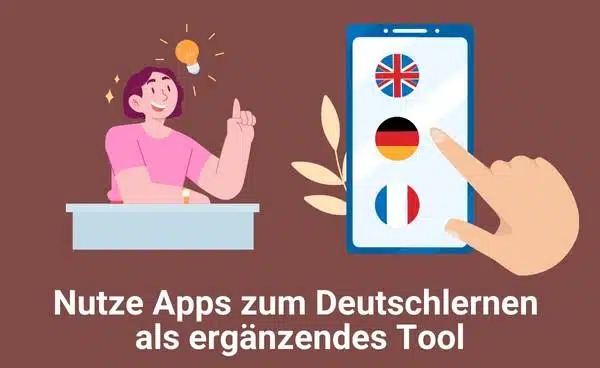So, you want to start learning German by yourself? Read this article to find out how to learn German A1 at home.
Key takeaways
- To learn German fast, you need to start at the very beginning.
- This means you need to learn the alphabet, which is the foundation of the language.
- You also need to know how to pronounce German words correctly.
- Once you have mastered this basic skill, you can move on to learning words.
- After that, you can start learning the basic sentences.
- One important thing you can do is to have conversations with locals.
- This way you can improve your grammar and vocabulary.
Topics in this article
Can I learn German A1 by myself? >>
Can I learn German A1 for free? >>
Use a good German course book >>
Use apps for learning German >>
Online courses for learning German >>
Look for an online tutor >>
Read and practice pronunciation >>
Test your language level >>
First question: Can I learn German A1 by myself?
Yes, you can learn German A1 by yourself. You can also participate in the A1 exam without prior attendance at a language school or prep course.
From my experience, I can give you 5 recommendations for how to learn German A1 at home:
Start listening and repeating the German alphabet
You will likely be familiar with most of the consonants and vowels, but there are a few exceptions in German. Those are the so-called „Umlaute, “the letters with two dots on top of them like „ä, “ ö“ and „ü. “
Those are unique to the German language, like the letter „ß“ that’s hardly used anymore in the written form.
Learn some easy words first
In my previous article about German greetings, you can learn some of the greetings commonly used in day-to-day and business situations. Those expressions would be „ja,“ „nein,“ „bitte,“ and „danke.“You should also consider learning to say yes, no, please, and thank you in German.
In some situations, it’s also nice to say the proper word for excuse me, „entschuldigen Sie mich, “ or sorry, „Entschuldigung“ in German.
Learn some nouns, verbs, and adjectives
Based on my A1 level course experience, I recommend learning some typical German nouns and verbs for beginners. They are not many, but they will help you understand some day-to-day conversations.
Learn useful German phrases
As a next step, you should learn some useful German phrases. From my experience, this approach is more straightforward than learning about sentence structure right away. Examples are:
„Mein Name ist XYZ und ich komme aus XYZ“ means „My name is XYZ, and I come from XYZ“ in English.
„Ich heiße XZY und arbeite als XYZ“ which is the equivalent for „My name is XYZ and I work as a XYZ.“
„Ich würde gerne ein Wasser bestellen“ which means „I’d like to order some water.“
Learn some basic grammar and build sentences
German has a different sentence structure than English, and the word order can also be different. People will understand you either way, even if the structure is not 100% perfect.
Don’t be shy, and practice those sentences in real life.
Can I learn German A1 for free?
I can’t answer this question with a yes or a no. The reason is that many online courses can help you with the basics.
On the other hand, the better resources are usually those you have to pay for.
Many free resources offer much material to read or are multiple-choice questions you can answer.
I found one example of a good German course on udemy*. This course can help you on your journey how to learn German.
Online courses like the one mentioned in the previous paragraph do not allow you to practice interaction with a native German speaker.
This lack of interaction is something you will miss with all online material, no matter if it’s free or not.
Depending on how you learn, it might be beneficial to take an official A1 course provided by one of the many language schools.
Tip #1: Use a good course book for learning German
I recommend getting some good course books to answer the question of how to learn German at home. Here are two more recent examples of good course books that I haven’t mentioned yet in my article about seven books for learning German.
„Deutsch ganz leicht A1“
For sure not the newest book on the market but still highly rated is the book „Deutsch ganz leicht A1“ by Renate Luscher.
Even if the book is from 2011 and seems a bit outdated by its looks, people seem to love learning from this book.
Many say that the book is worth the money. Since the book comes with 2 Audio CDs and many newer laptop or desktop computers no longer have a CD ROM Drive, you can write the publisher. And then ask them for audio files as a download.
By the way, the publisher Hueber is well known for its language course books, so you are definitely in good hands here.
„German Short Stories for Beginners“
Another way to learn German might be by reading compelling stories that are not too difficult to understand.
The book I can recommend here is “German Short Stories for Beginners” by Lingo Mastery.
Even if some of the reviewers might complain about some mistakes here and there in the book, the stories are enjoyable to read and help with expanding your vocabulary and sentence structure.
Especially at the beginning, it’s helpful to get one of the standard dictionaries like this one from Langescheidt.
The dictionary offers a dictionary app that leads me to my next topic.
Tip #2: Use apps for learning German as a complementary tool
In times of digitalization being everywhere, you might wonder how to learn German with the help of an app.
The three most significant players in the market for learning German with an app are Babbel, rosetta stone, and Duolingo.
Here is a fun fact: “babbel” in German means “speak with little kids or babies”. It has been used since the 16th century in Germany.
All those apps, while rosetta stone is maybe the most expensive, offer you lots of material, reasonable structure, and many vocabulary and grammar hints.
They can all support you on your journey to learn German at home.
Tip #3: Find an excellent online course for learning German
I know from some of my foreign colleagues that there are two great online courses to learn German.
Let me tell you more about those:
Goethe
The Goethe Institut in Germany offers many opportunities to learn German at different levels. By the way, Goethe Institut provides online and face-to-face courses in many other cities across Germany.
My colleagues told me that they were delighted with the online courses.
The courses themselves are not only at convenient times but also twice a week. There is a limited number of participants, and the price point is 399 euros for the A1 course.
Each course lasts five consecutive weeks, so you should pick a time when you can participate in all lessons.
Lingoda
Lingoda* follows a slightly different concept. They offer live classes 24/7, so you get the complete flexibility to learn any time you can. The learning happens in tiny groups or even 1-on-1s.
You can quickly try it as a free 7-day trial is available online. So learning German with them can be very easy, and you are encouraged to practice speaking right from the start.
They do offer a specific program that helps you on your way to acquiring the A1 level in German.
Tip #4: Or look for an online tutor
One of the best language learning apps that offer online access to certified tutors is probably Italki*. You can find German teachers online on this platform, and the hourly rates start from 5€ an hour.
Their offer differs between group lessons and single lessons. Single classes are usually more expensive, while group lessons are not.
There is also a difference in the kind of teachers that give those lessons.
On the one hand, there are teachers with proven experience and certificates in teaching German to foreigners.
On the other hand, there are teachers with no certification and much knowledge on the platform whose lessons are more affordable.
Tip #5: Make sure you read and practice the correct pronunciation
The most challenging part of how to learn German A1 at home is reading practice and training your pronunciation skills. As long as you have no access to someone who is a native German, the pronunciation is sometimes harder to get.
What helped me a lot were two things:
Watching well-known movies in German with subtitles
If you know some movies by heart, it makes sense to watch those with English subtitles (for the overall understanding) but with German audio. Consider watching those movies alone and practice your pronunciation by repeatedly saying parts of the lines in the movie.
Finding actual German YouTube channels
There are many YouTubers from Germany that cover many genres.
Whether you are into gaming, crafting, or you name it, you will find someone from Germany talking about this topic.
Youtube offers many more extensive English-language subtitles that help you understand the context.
Tip #6: Test your language level with a German online test
I already wrote an extensive article about taking a German language-level assessment online. As you progress, consider taking a test every once in a while.
This helps you to assess what kind of progress you made and where there might be gaps. Official German A1 tests cost money, and you would not necessarily want to waste money on them as long as you are not yet ready.
Conclusion
As you can see, answering the question of how you can learn German for beginners at home is difficult. From my experience, everyone should be able to master that.
But make sure you spend enough time learning German before taking the test.
Even if it’s the first entry-level test, it’s not as easy as you might expect it to be.
With enough time, it’s manageable if you want to start learning from home for the A1 test.
USEFUL INFORMATION ABOUT LEARNING GERMAN
> 25 Formal Greetings in German You Should Know
> Learn How to Write an Email in German | Step-by-Step Guide
> Top 10 German Language Level Test Tools Online Today
> Is it hard to learn German? No, if you follow these simple tips
> What level of German is required to work in Germany today?
> 10 Ways To Learn Business German Fast
> Checked: How to get B2 Level in German at Goethe Institut
> Effective Online Courses For German Language
* The links that are marked in this way are affiliate links and indicate that we receive a small commission if you decide to buy the products or service









